How to successfully start a life coaching business is a rewarding journey that lets you make a real impact on others’ lives. It’s more than just a job, it’s an opportunity to help people break through barriers, set meaningful goals, and create lasting change. You get to be the guide on their journey while enjoying the freedom of being your own boss. But building a successful practice takes time, focus, and strategy.
From finding your niche to marketing your services, every step plays a key role in making your coaching business thrive. It’s like laying down the foundation of a house, if you don’t get it right, everything else becomes harder.
Let’s walk through the steps together and turn your passion for helping others into a thriving, successful business.
Step 1: Understand Qualifications and Certification Options

Do You Need a Degree to Become a Life Coach?
You don’t need a formal degree to become a life coach, but the best coaches have qualities that help them connect with clients. Skills like empathy, active listening, and flexibility are essential to building trust and guiding others. While many successful coaches come from psychology or counseling backgrounds, it’s your ability to understand clients and offer meaningful support that matters most. Your real value lies in how well you can connect, listen, and help clients move forward.
Certification for Credibility
While certification isn’t mandatory, it can help you stand out in a crowded market. Becoming certified through respected organizations like the International Coaching Federation (ICF) or the Center for Credentialing & Education (CCE) shows potential clients that you adhere to industry standards and are committed to your craft. Certification programs teach important skills, like coaching techniques, ethics, and client management, which will deepen your practice and build trust with clients.
Developing Core Skills
Life coaching is about more than just giving advice, it’s about building relationships. Strong skills in active listening, empathy, and clear communication are at the heart of what makes a great coach. To become more effective, practice these skills with a mentor or by working with friends and family. The more you understand your client’s needs and help them take action, the greater the impact you’ll have. Trust is the foundation of lasting change, and that starts with how well you communicate.
At the end of the day, what sets you up for success isn’t your degree or certification, it’s your ability to connect, help others move forward, and create meaningful change. By developing core skills and building authentic relationships, you’ll be ready to succeed as a life coach.
Step 2: Find Your Niche
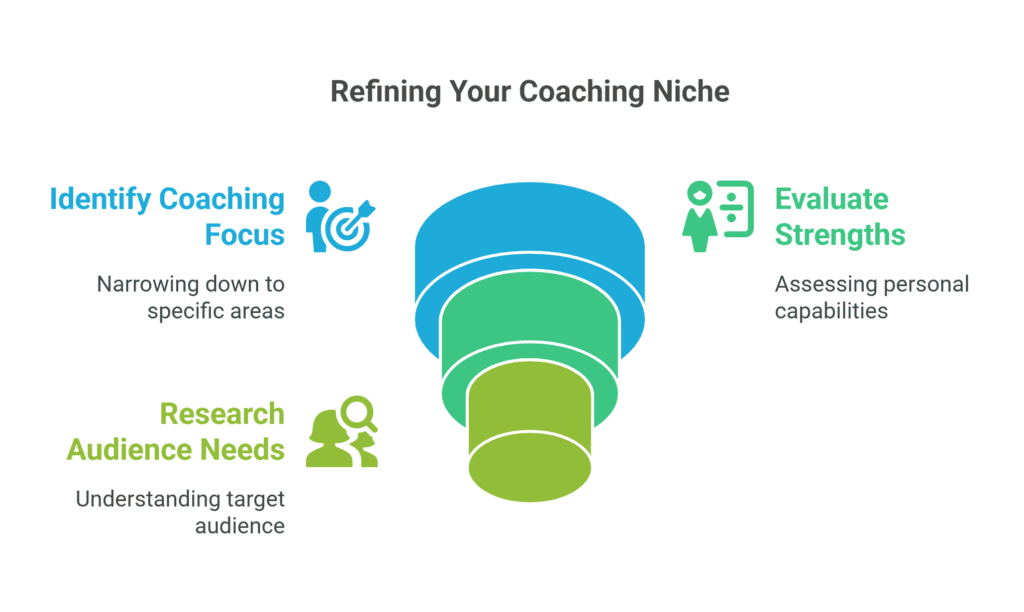
Identify Your Coaching Focus
Picking a niche is like choosing a direction on a map it helps you stay focused and attract the right clients. Whether it’s career coaching, wellness, relationships, or personal finance, narrowing your focus allows you to become an expert in that field. Think of it like a chef specializing in one type of cuisine by mastering that one thing, you can build a loyal following who turn to you for that specific experience. Clients want specialists who understand their unique needs.
Evaluate Your Strengths and Interests
Your niche should feel like a natural fit, something that combines your skills and passions. Reflect on areas where you have personal experience or insights. Maybe you’ve navigated a career change or overcome health challenges yourself. When your niche aligns with what excites you, it’s easier to stay motivated, and clients can sense that enthusiasm. Passion is contagious; when you love what you do, it shows, and clients are more likely to engage with you.
Research Audience Needs
To truly connect with your clients, you need to understand what keeps them up at night. What are their struggles? What do they need help with most? Dive into online forums, social media, or have conversations with people in your target market to uncover their pain points. For example, if you choose career coaching, do your clients need help finding a job, or are they more focused on work-life balance? Understanding these needs allows you to fine-tune your services and provide real solutions.
By choosing a niche that matches both your strengths and your audience’s needs, you’ll create a coaching business that’s not just successful but also fulfilling. Now that you’ve found your focus, it’s time to build a strong brand that reflects your expertise and passion. Let’s move on to the next step, creating a brand that attracts clients.
Step 3: Build Your Brand
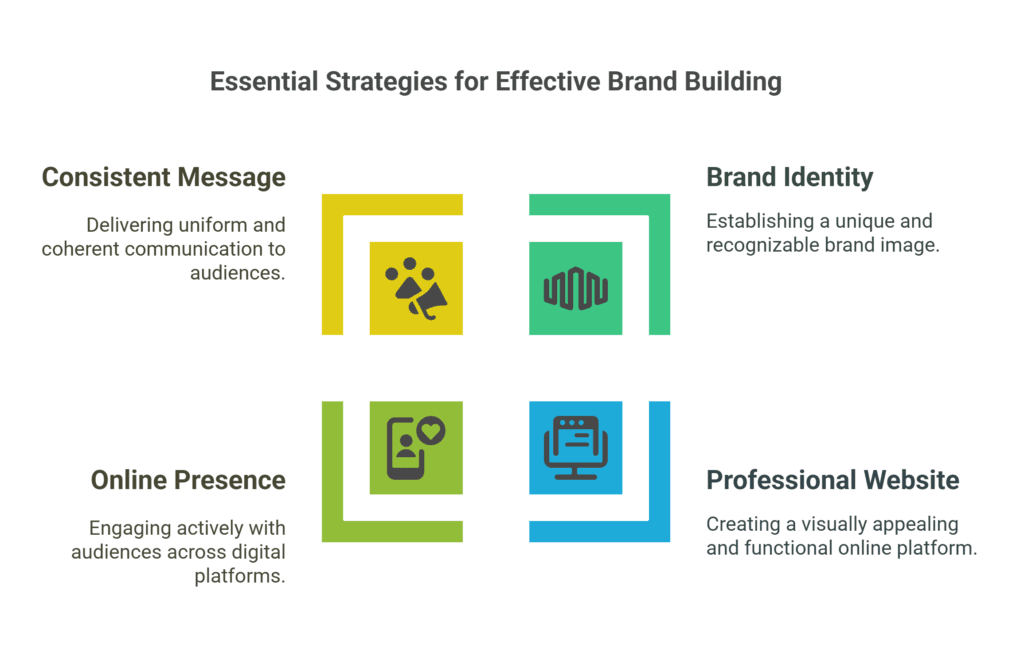
Create a Strong Brand Identity
Your brand is more than just a logo, it’s how clients feel when they interact with you. It’s the story you tell and the values you stand for. What makes you unique as a coach? Maybe it’s your journey or your ability to help clients see quick results. Whatever it is, your brand should communicate it. A strong brand helps potential clients connect with you and trust that you can help them reach their goals.
Design a Professional Website
Think of your website as your online home, it’s where clients go to learn more about you and your services. Keep it simple, clean, and easy to navigate. Include a clear “About Me” section where you share your story and how you can help clients. Add a blog or resources where you can offer valuable tips, and make sure it’s easy for clients to contact you or book a session. Your website should feel welcoming and make people want to take the next step in working with you.
Build an Online Presence
In today’s world, your online presence is essential. Create social media profiles on platforms like Instagram, LinkedIn, or Facebook. Post regularly about topics related to your niche, share client success stories, and offer helpful tips. Consistency is key by showing up often and authentically, you’ll stay top of mind for potential clients. Over time, you’ll build trust and a loyal following who see you as the go-to expert.
Craft a Consistent Message
Every piece of content you share, from your website to your social media, should reflect the same message and tone. Whether you’re professional, casual, or motivational, consistency makes your brand recognizable. It’s like a favorite café when you walk in, you know exactly what to expect. A clear, consistent message builds trust, and clients will know what they can expect from you every time.
By creating a strong brand identity, establishing an engaging online presence, and keeping your message consistent, you’re setting the stage to attract clients who truly connect with what you do. Now that your brand is solid, let’s dive into the next step, marketing your services and spreading the word about your coaching.
Step 4: Market Your Services
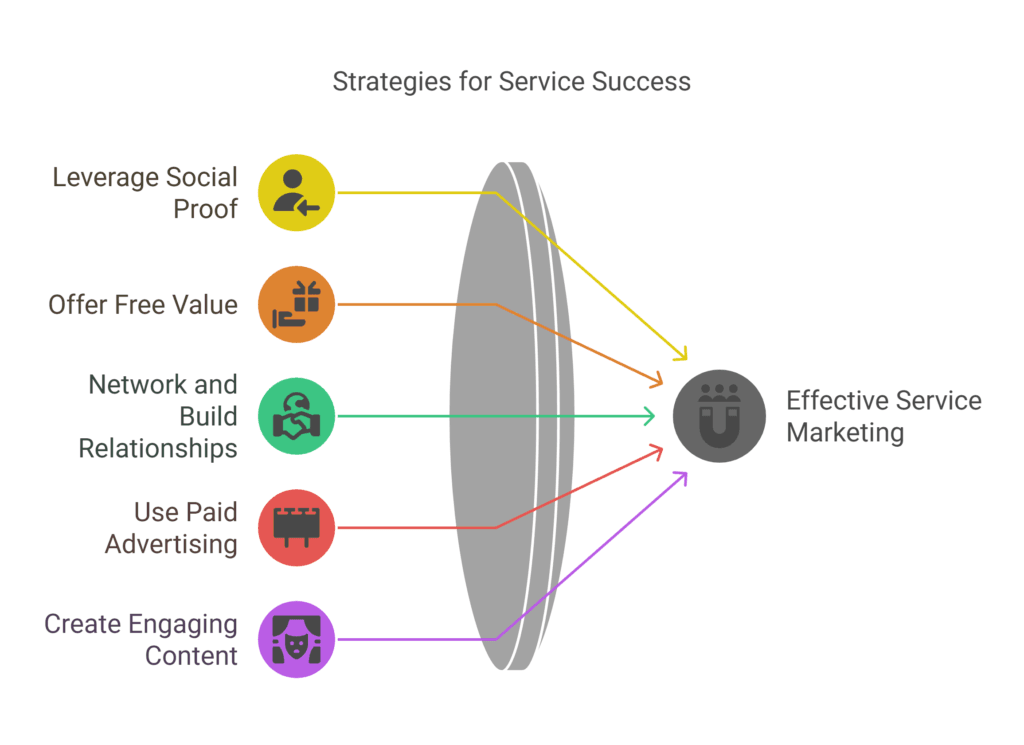
Leverage Social Proof
One of the best ways to attract clients is by letting your satisfied customers speak for you. Testimonials, reviews, and success stories are powerful tools. As you coach, ask clients for feedback and encourage them to share their experiences. A glowing review can be the tipping point for someone on the fence about your services. Post these stories on your website and social media. People trust the opinions of others more than what you say about yourself, so let your clients do the selling.
Offer Free Value
Offering value upfront is a great way to get noticed. Provide free resources like blog posts, videos, or downloadable guides that solve common problems in your niche. You could also host a free webinar or offer a free consultation to give potential clients a taste of what you offer. When you give real value without expecting anything in return, you build trust and increase the likelihood that they’ll invest in your paid services later.
Network and Build Relationships
Networking is about building relationships, not just promoting yourself. Attend local or online events, engage in groups related to your niche, or team up with other coaches and professionals. Focus on being helpful and contributing to discussions. As you build trust with others, you’ll naturally start getting referrals and recommendations.
Use Paid Advertising
While word-of-mouth is powerful, paid ads can help you reach a bigger audience faster. Platforms like Facebook, Instagram, and Google Ads allow you to target specific groups based on interests, age, location, and more. Start small, test different ads, and track your results. Paid ads are a quick way to boost exposure, but be sure to have a clear strategy and budget before diving in.
Create Engaging Content
Content marketing works over time by building trust and showing your expertise. Share articles, videos, podcasts, or infographics that help your audience solve problems. The more value you provide, the more people will see you as an expert in your field. Plus, it gives potential clients a chance to connect with your personality and coaching style.
By using social proof, offering value upfront, networking, experimenting with paid ads, and consistently creating helpful content, you’ll build a steady flow of clients. The more people trust you, the more they’ll reach out for your services. Now that you’re gaining clients, let’s talk about managing your business efficiently.
Step 5: Manage Your Business Efficiently
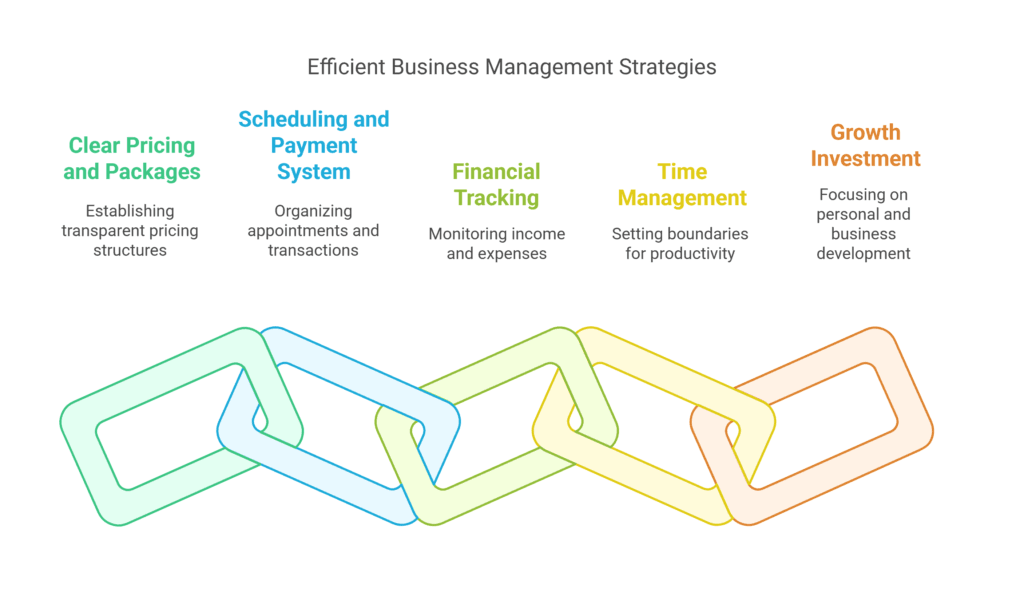
Set Clear Pricing and Packages
To run a successful coaching business, you need a clear pricing structure. Decide whether you’ll charge per session or offer packages. Packages can give clients more value and give you a steady income. Be open about your pricing on your website, so clients understand what they’re paying for and what they’ll get in return. Transparency builds trust and confidence.
Create a System for Scheduling and Payment
As your business grows, scheduling and payments need to be easy and efficient. Use tools like Calendly or Acuity for booking sessions, and payment platforms like PayPal or Stripe for secure transactions. Automating these tasks saves time and lets you focus on what matters most coaching.
Track Your Finances and Expenses
Keep a close eye on your income and expenses. Simple accounting tools like QuickBooks or FreshBooks can help you track payments and manage taxes. Understanding your finances helps you make smart decisions about where to invest and when to scale your business.
Set Boundaries and Manage Your Time
Coaching is rewarding, but it can also be demanding. Set clear boundaries with clients about availability and session times. Make sure you schedule time for admin work, marketing, and self-care. Balancing work and personal time keeps you energized, so you can show up as your best self for your clients.
Invest in Your Growth and Development
The best coaches are always learning. Whether it’s through workshops, certifications, or mentorship, investing in your growth keeps you ahead of the curve. Remember to care for yourself too, your well-being impacts your coaching effectiveness.
By creating clear pricing, streamlining scheduling, tracking your finances, setting boundaries, and investing in your growth, you’ll set up your business for long-term success. Now that you have the basics in place, it’s time to scale and grow your coaching business to new heights.
Step 6: Scale and Grow Your Coaching Business
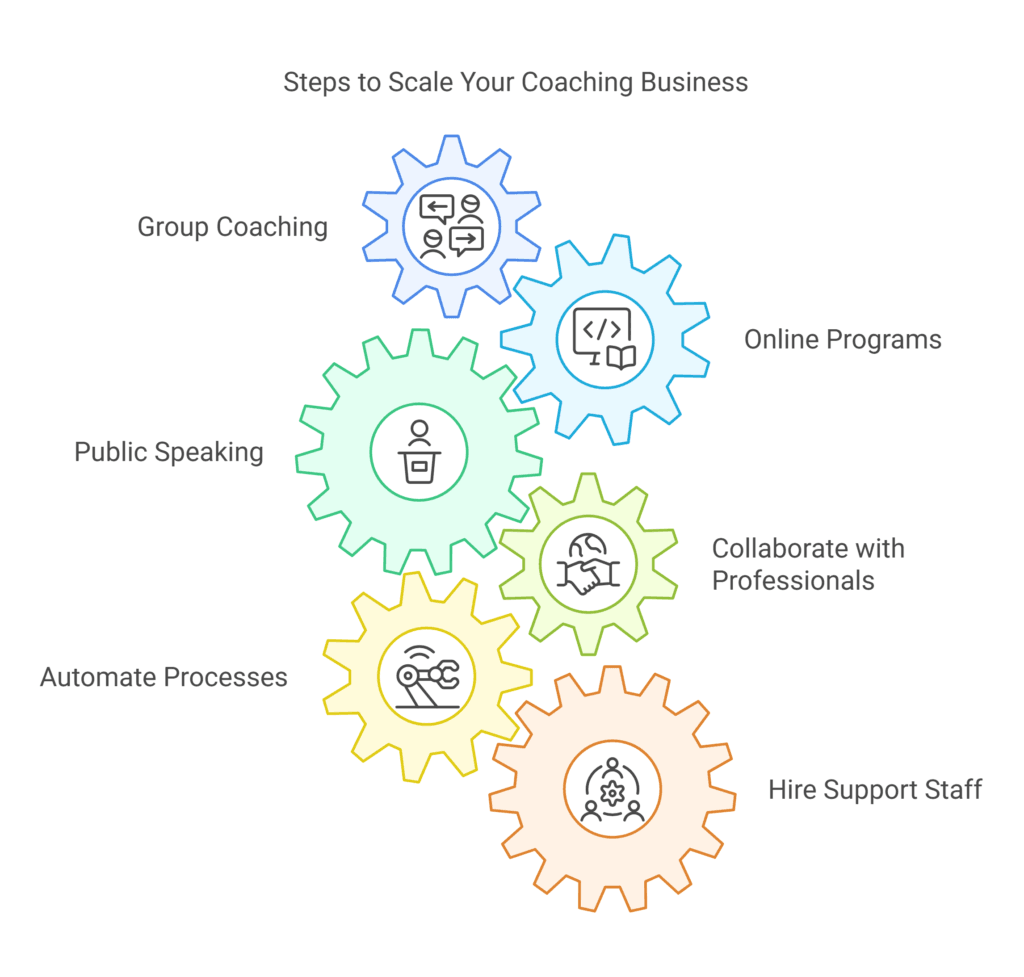
Leverage Group Coaching and Workshops
Once you’ve built a strong client base, think about offering group coaching or workshops. This lets you work with several clients at once, boosting your income without adding too much extra time. Plus, it positions you as an expert and helps you reach more people in a single session.
Offer Online Programs and Courses
Creating online courses or programs is a great way to scale. These can be video lessons, written guides, or interactive workbooks that clients can access at their own pace. Online programs let you reach a larger audience and create passive income, meaning you make money even when you’re not working. If you’ve built a following, offering a course based on your expertise can increase your revenue.
Expand Your Reach with Public Speaking
Public speaking is an excellent way to grow your business. Whether it’s webinars, conferences, or free talks, speaking engagements help you share your knowledge with a bigger audience. It also boosts your credibility and attracts new clients interested in one-on-one coaching.
Collaborate with Other Coaches or Professionals
Partnering with other coaches or professionals can help you expand your reach. By working with people in related fields like wellness coaches or financial experts, you can offer joint workshops or services, exposing you to new audiences and providing added value to your clients.
Automate and Streamline Your Processes
As your business grows, automate as much as possible. Use tools to manage marketing, email campaigns, and client scheduling. Automating these tasks gives you more time to focus on what you do best coaching.
Hire a Team or Support Staff
When demand for your services grows, it’s time to think about hiring support. A virtual assistant, a social media manager, or another coach can help you manage the workload, freeing you up to focus on growing the business and serving your clients.
By adding group coaching, online courses, public speaking, collaborations, and automation, you’ll see your business scale. These steps boost your income, expand your reach, and help you impact more lives. Ready to keep growing? Let’s move on to how to maintain that growth over time.
Step 7: Maintain Long-Term Growth

Focus on Client Retention
It’s not just about bringing in new clients, it’s about keeping the ones you’ve already worked with. Clients who feel supported and valued are more likely to stick around and even refer others. Check-in with your clients regularly, offer follow-up sessions, or create loyalty discounts for long-term commitments. A little extra care goes a long way in building a lasting relationship.
Keep Learning and Growing
As your business grows, so should you. Don’t rest on your laurels, keep improving your skills, learn new techniques, and stay updated on the latest trends. Whether it’s through workshops, online courses, or networking with other coaches, make sure you’re always learning. The more you improve as a coach, the more your clients will benefit. And when your clients benefit, your business thrives.
Build a Strong Community
A solid community of clients and followers is one of your biggest assets. Stay active on social media, interact with your audience, and be open to feedback. Share helpful content, celebrate client successes, and show the human side of your business. A strong community makes clients feel like they belong and they’re more likely to stick with you for the long haul.
Measure Your Progress
Growth means change, and it’s important to track your progress. Take time to review key numbers: how many clients are you retaining? How much revenue is coming in each month? Regularly checking these metrics gives you the insight you need to adjust and improve. Think of it like checking your car’s dashboard, you wouldn’t drive long without making sure everything’s running smoothly.
Diversify Your Income
To keep growing, don’t rely on just one source of income. Look for ways to expand, like creating online courses, offering group coaching, or writing e-books. Multiple income streams help you stay stable and open up new opportunities. The more ways you can bring in revenue, the stronger your business becomes.
Stick to Your Vision
It’s easy to get distracted by the next big opportunity, but it’s important to stay focused on your long-term goals. Why did you become a coach? What impact do you want to make? Keep your vision clear, and make sure your decisions align with it. When you stay true to your vision, everything else falls into place.
By focusing on client retention, staying committed to your growth, building a loyal community, measuring your success, diversifying your income, and sticking to your vision, you’ll build a business that lasts. Keep growing, stay focused, and your coaching business will continue to thrive.
How to Start a Life-Coaching Business from Home
Starting a life coaching business from home offers flexibility and convenience. The first step is to create a dedicated home office space where you can focus and maintain a professional environment. This could be a spare room or even a well-organized corner of your living space, just make sure it’s quiet, comfortable, and free from distractions.

Next, you’ll need to choose the right remote coaching tools to ensure smooth communication with clients. Platforms like Zoom or Google Meet are great for virtual sessions while scheduling tools like Calendly make booking appointments easier for both you and your clients.
Also, remember to set up secure online payment options like PayPal, Stripe, or Square, so clients can easily pay for their sessions. This helps keep your business running smoothly without needing to meet clients in person.
Finally, maintaining strong communication through email, social media, and your website is key to growing your client base from home. A professional website with a clear message, easy navigation, and ways to book sessions online is essential to make your business accessible to clients anywhere.
With the right setup and tools, a home-based life coaching business can thrive providing you with the opportunity to work from the comfort of your own home while making a real impact on your clients’ lives.
Conclusion
Starting a life coaching business is not just about building a career it’s about making a real impact on people’s lives and helping them achieve their fullest potential. By following the steps in this guide from gaining the right qualifications and defining your niche to marketing your services and fostering strong client relationships you’ll lay the groundwork for a successful coaching practice. Life coaching is a powerful tool for transformation, and when done right, it’s not only a profession but a calling. Success in this field isn’t just about expertise; it’s about passion, strategy, and continuous growth for both your clients and yourself. If you’re ready to turn your passion for helping others into a meaningful and rewarding career, the time to act is now. Your journey starts today, make it count!
FAQ
What Services Does a Life Coach Provide?
A life coach offers various services, including goal-setting, accountability, and personal growth plans. These core services help clients define their objectives, stay on track, and create meaningful change in their lives. Depending on your niche, you might offer specialized services like career coaching, wellness coaching, or relationship coaching. For example, if you focus on career coaching, you might help clients with job search strategies, career advancement, or work-life balance. By identifying your niche, you can provide specific services that attract the right clients and address their unique needs.
What Education Do You Need to Become a Life Coach?
While formal education isn’t required to become a life coach, gaining knowledge through specialized coaching programs or workshops is highly recommended. These programs offer coaching techniques, ethical guidelines, and client management skills to help you succeed. Certification through recognized organizations like the International Coaching Federation (ICF) can give you credibility and show that you are committed to following industry standards. Even without a degree, enrolling in coaching workshops and training programs will provide you with the educational foundation you need to be effective as a coach.
What Skills Do You Need to Be a Life Coach?
To be a successful life coach, developing key skills is essential. Active listening, empathy, and clear communication are foundational skills that will help you understand clients’ needs and guide them effectively. As a coach, you need to listen carefully to your clients, ask insightful questions, and provide actionable advice. Your ability to connect with clients and help them take meaningful steps forward is crucial to their success. These skills, along with your passion for helping others, will ensure you can deliver great value and create lasting change for your clients.
Does a Life Coach Need a Business License?
Yes, a life coach may need a business license depending on the location where they operate. Before starting your practice, check local regulations to determine if you need to register your business or obtain any tax-related licenses. This step is important to ensure you’re legally compliant and operating professionally. Consulting with a small business lawyer or accountant can help clarify any local legal requirements. Setting up the right legal structure for your coaching business helps you avoid future complications and builds trust with your clients.





